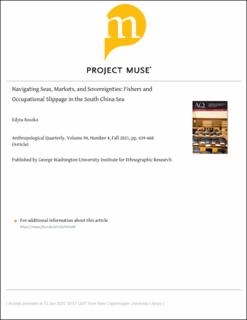Navigating Seas, Markets, and Sovereignties: Fishers and Occupational Slippage in the South China Sea
Journal article, Peer reviewed

Permanent lenke
https://hdl.handle.net/11250/2838795Utgivelsesdato
2021-12-01Metadata
Vis full innførselSamlinger
- Publications [1488]
Originalversjon
in Anthropological Quarterly vol. 94 no. 4 10.1353/anq.2021.0046.10.1353/anq.2021.0046
Sammendrag
Oceans have always been arenas of crime, drugs and human trafficking, and poaching. When such violations occur on fishing boats, they fall under the rubric of “fisheries crime.” Political scientists and economists have tended to assume that these criminal fishers simply abandon their legal occupation and take up illegal practices, labelled “transnational organized fisheries crime” by the United Nations. On the other hand, some scholars have also argued that subsidized and militarized fishers in the South China Sea are simply acting as instruments of their states’ geopolitical agendas, responding to regulations, non-enforcement of regulations, and incentives. Such present-centric approaches both obscure the modalities of fishers’ embodied skills and knowledge and their motivations, and downplay the inter-ethnic networks that connected different fishers beyond state territories and localized fishing grounds in past and present. Charting the spike in maritime trespass in (and out of) the South China Sea, this article combines ethnography and historiography to show how fishers move in and out of legal and illegal, state and non-state categories of fisher, poacher, trader, smuggler, and militia. I propose the concept of occupational slippage as a way of going beyond the fiction of fishing as mono-occupational and theorizing the realities of fishers as mobile maritime actors who enact andconceal multiple—simultaneous and consecutive—livelihood strategies while navigating not just seas, but also markets and territorial sovereignties. Thus, I argue that the fishers’ practices reflect wider interconnections between modern, state-supported, and technology-driven fisheries with older pre-nation-state patterns of mobility and knowledge accumulated through generations, producing new forms of versatility that operate under the states’ radars. [Keywords: Fishers, occupational slippage, tidalectic, market, sovereign
Serie
Anthropological Quarterly vol. 94 no. 4Anthropological Quarterly vol. 94 no. 4
Anthropological Quarterly vol. 94 no. 4